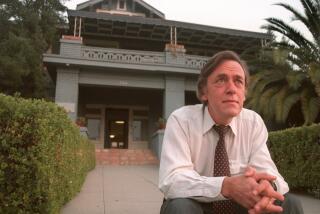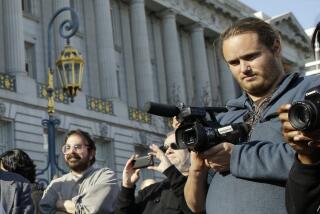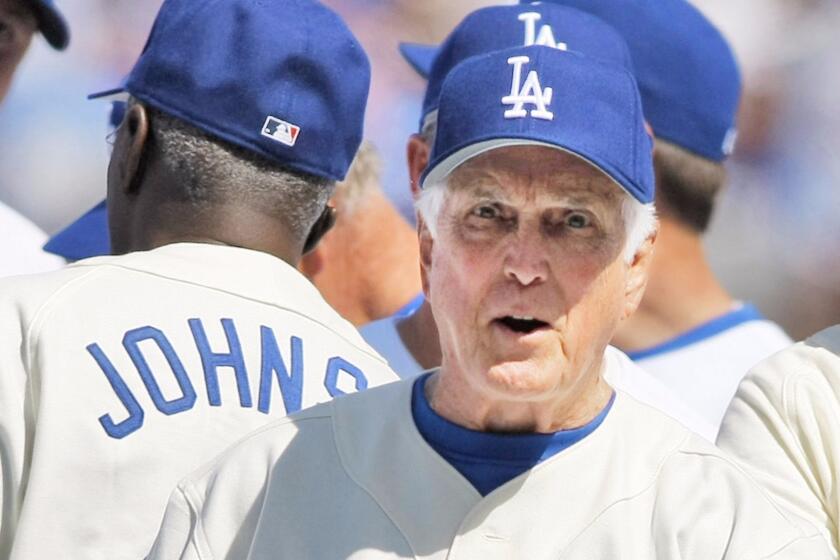Leonard Weinglass dies at 77; defense lawyer in Pentagon Papers case
Leonard Weinglass, a crusading lawyer who championed radical and liberal causes and clients in some of the most controversial trials of the 1960s and ‘70s, including the Chicago 7 and Pentagon Papers cases, died Wednesday in New York City. He was 77.
The cause was pancreatic cancer, said Michael Krinsky, a colleague and friend of 40 years.
Weinglass, who practiced in Los Angeles for two decades before moving to New York, developed a reputation as a firebrand during the Chicago 7 conspiracy case against anti-Vietnam War protesters at the 1968 Democratic National Convention. The defendants included Tom Hayden, Abbie Hoffman and Jerry Rubin. Although Weinglass was considered less boisterous than co-counsel William Kunstler, he was nonetheless cited for contempt 14 times during the five-month trial, which resulted in acquittals.
He went on to defend other notorious clients, including Jane Fonda, Symbionese Liberation Army members William and Emily Harris, Angela Davis, Kathy Boudin and Mumia Abu-Jamal. He also represented former President Carter’s daughter, Amy, who in 1987 was charged with disorderly conduct after an anti-CIA demonstration at the University of Massachusetts.
Until days before his death, Weinglass was drafting briefs on behalf of the so-called Cuban Five — five Cuban intelligence agents who were convicted in 2001 of spying in the United States on behalf of the government of then-President Fidel Castro.
“He was committed to defending people who had controversial political views and in one way or another was trying to change things, from civil rights to the antiwar movement,” Krinsky said.
Weinglass’ most important case was the Pentagon Papers trial, which was brought against defense analyst Daniel Ellsberg and researcher Anthony Russo for Ellsberg’s unauthorized release of a top-secret government history of U.S. involvement in the Vietnam War. The case against them was dismissed May 11, 1973, after the court learned that a covert team had broken into the offices of Ellsberg’s psychiatrist looking for information to discredit the star defendant.
As the lead defense lawyer in that case, Weinglass “understood the political significance of the papers and what the Nixon administration was trying to suppress. It was Act I of Watergate,” said Mark Rosenbaum, chief counsel for the American Civil Liberties Union of Southern California, who worked with Weinglass on the case.
Weinglass was born Aug. 27, 1933, in Belleville, N.J. His mother was, he once recalled, “an Adlai Stevenson Democrat,” but his pharmacist father was a Republican. When Weinglass was defending the Chicago 7, his father told him, “They ought to throw all of you in jail without bail.”
He knew from an early age that he wanted to become a lawyer. He read the words of Clarence Darrow while sweeping the floors in his uncle’s law office. A football star in high school, he earned a bachelor’s degree from George Washington University in 1955 and a law degree from Yale University in 1958. After two years in the Air Force, he opened a storefront criminal defense practice in Newark, N.J.
In 1964 he met a Newark activist named Tom Hayden, who changed his life. When Hayden, a leader of Students for a Democratic Society, was arrested at the Democratic National Convention in Chicago three years later, he asked Weinglass to defend him.
“I had to convince my codefendants that we needed a terrific courtroom lawyer,” Hayden said in an interview Thursday. “They’d never heard of him. He wasn’t involved in the movements. But I never met anyone in my life as good in a courtroom as Len Weinglass. He would never lose his temper or raise his voice. He tried to be as persuasive as possible and as plain spoken as possible. He also always did preparatory work on motions that might arise.”
The trial, which turned into a media circus with testimony from such ‘60s icons as LSD guru Timothy Leary and poet Allen Ginsberg, radicalized Weinglass.
“The fact that the U.S. government could … seek to put away people because of their political dissent was really a major eye-opener for me,” he told Progressive magazine in 1996. “I had read and heard of such things, but I had never been directly involved in such an event.”
His soft-spoken intensity and dedication to his clients earned praise from judges and prosecutors. “He’s a hell of a thinker on his feet,” the judge in the Harris case, Mark Brandler, told The Times in 1980, “and even when he was espousing his political causes during pretrial motions, he at least did it with dignity.”
Weinglass is survived by two sisters, Elaine Nicastro of Lebanon, N.J., and Natalie Franzblau of Nutley, N.J.; and a brother, Steven Weinglass of Los Angeles.
More to Read
Start your day right
Sign up for Essential California for the L.A. Times biggest news, features and recommendations in your inbox six days a week.
You may occasionally receive promotional content from the Los Angeles Times.







